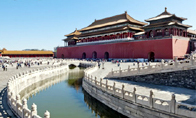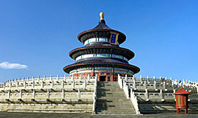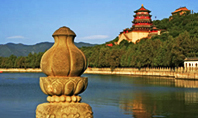
On the afternoon of December 1, Foreign Ministry Spokesman Qin Gang held a regular press conference.
Qin: Good afternoon, ladies and gentlemen! Today, I don't have announcement to make. The floor is open now.
Q: It is reported that the UN intends to send an expert team to China to assist China to handle the pollution of Songhua River. Is China willing to receive such a UN expert team? Another report alleged that China would offer compensations to Russia. Please confirm. My third question is that the ROK proposed to hold an informal meeting on the nuclear issue on the Korean Peninsula in ROK. What's China's position on this proposal? Will China accept?
A: The Chinese Government takes a positive, open and practical attitude towards the international cooperation on control of Songhua River pollution. The competent authorities of China have informed the UNEP Office in China and other UN organizations of the latest development. We have also contacted the UNEP on inviting their senior officials to make on-site inspection in Harbin. Now, the pollution slick is still floating within Chinese territory, and China will take every effort to remove pollution as much as possible. The competent authorities are organizing experts on different parts to make assessment of the pollution trend and impact. We will take stock of the assessment result and invite the experts from the UN organizations to make on-site inspection when necessary.
On your second question, since the incident of Songhua pollution took place, the Chinese Government and leaders have been deeply concerned over the possible impact on the downstream Russian people. We attack importance to and understand the concern of Russia. Chinese leaders have made important instructions on many occasions. After the incident, Chinese Foreign Ministry, Ministry of Water Resource and State Administration of Environmental Protection have made promptly and effective communication with their counterpart authorities of Russia, and promptly informed the Russian side of water quality and monitoring data on daily basis. Chinese and Russian environmental protection departments have also set up a hotline link. A Russian expert team is on inspection tour in Harbin. We will keep close cooperation with the Russian expert team and conduct joint monitoring. China also decided to present Russia with equipment capable of fast detection of benzene-based pollutants and is ready to send people to Russia for installation, debugging and training. The 6 sets of chromatogram equipment and 150 tons of active carbon we send to Russia are ready and the active carbon is on the way. We expect as well the timely cooperation on the Russian part on going through receipt formalities, so as to ensure the prompt delivery of the chromatogram equipment. In addition, the environment protection departments of the two sides are making consultation on the Memorandum of Understanding on Joint Water Quality Monitoring at China-Russia Boundary River, as part of the effort to step up cooperation on protection of the water quality of cross-border river. All in all, China and Russia are friendly neighbors and have strategic partnership of cooperation. We are ready to stay in close cooperation and communication with Russia in the spirit of friendly cooperation, and strive to minimize the possible impact of the incident on Russia.
As for compensation, as far as I know, the two sides did not touch upon the issue.
Regarding the ROK's suggestion, we believe that it serves the interest of all parties concerned to eventually realize the goal of a nuclear-weapon-free Korean Peninsula through the Six-Party Talks mechanism and maintain the peace and stability on the Peninsula. China is open to all suggestions and propositions, as long as they help promote the Six-Party Talks process and the peaceful solution of the nuclear issue on the Peninsula. We are willing to maintain close contacts and consultation with all the parties concerned on how to further promote the Six-Party Talks and listen to the opinions of other parties.
Q: What expectation does China have for the upcoming East Asia Summit? Some observers expressed their concern that China would use the East Asia Summit to expand its influence in this region. Do you deem the concern reasonable?
A: Yesterday, Chinese Foreign Ministry held a briefing on Premier Wen Jiabao's visit to five European and Asian countries and attendance at the 10+3 and 10+1 Summits and East Asia Summit. Director-General Cui Tiankai has answered your question at the briefing.
We think that the East Asia Summit is a new thing emerging in the process of East Asia cooperation, which sets up a new platform for dialogue and cooperation between the relevant countries. We attach great importance to the East Asia Summit and hope the summit will help promote the existent cooperation in East Asia and realize the common development of East Asia and the rest of world. The parties concerned are now discussing on the draft of Kuala Lumpur Declaration proposed by ASEAN. China supports the leading role of ASEAN in the East Asia Summit, respects the consensus reached among ASEAN on the declaration of summit and is ready to enhance communication and coordination with the parties concerned, so as to ensure the success the first East Asia Summit. We believe through this summit, the East Asian countries will make an in-depth exchange of views on the issues of common interest and thus strongly push forward the cooperation in the region.
All the countries in this region are equal members of the East Asian family. To maintain the peace, stability and development serve the interest of all countries in the region and the countries in the region should participate in East Asian cooperation on an equal footing, strengthen dialogue and consultation and seek common development and win-win scenario.
Q: At yesterday's briefing, Director-General Cui Tiankai disclosed that China will forward a proposal on military exchange at the East Asia Summit. Please confirm and brief on the content and purpose of the military exchange.
A: Yesterday, I also attended the briefing. According to my memory, Director-General Cui did not tell this question will be included in the 10+3 Summit. What I have got is China does not consider forwarding such a proposal. The parties concerned will take 10+1 and 10+3 Summits and the East Asia Summit as platforms to exchange views and opinions on the major issues of this region. What to discuss at the Summits depends on the development of the meetings.

Q: Please brief on the details of UN Secretary General Annan's visit to China, including his agenda, meeting arrangements and topics. The UN Special Rapporteur on Torture has been in China on visit for a week. Please tell us how his visit is going on. Why did China now allow his visit while having refused his visit for the past decade?
A: At the invitation of the Chinese Government, UN Secretary General Annan will pay an official visit to China from December 4th to 7th. During Mr. Annan's visit, President Hu Jintao, Vice Premier Hui Liangyu and State Councilor Tang Jiaxuan will meet with him. Deputy Foreign Minister Dai Bingguo will hold talks with him to have an exchange of views over international and regional issues of common interest and cooperation between China and UN. During his visit, Secretary General Annan will go to Peking University to talk with students there and receive interview from the Chinese media. We will keep you updated with further information when Secretary General Annan's visit goes on.
At the invitation of Chinese Foreign Ministry, UN Special Rapporteur on Torture Nowak pays a 12-day visit to China from November 21st to December 2nd. Now the visit has yet to be concluded.
It is the first time for UN Special Rapporteur on Torture to visit China. In the spirit of mutual respect, trust and understanding, the two sides determined the agenda after consultation. The Rapporteur has visited Beijing, Lhasa and Urumchi. The principal officials of Chinese Foreign Ministry, Ministry of Justice, Ministry of Public Security and Supreme People's Procuratorate met with Mr.Nowak and briefed him on China's position and policies to oppose and prohibit torture. Principal officials of the above departments talked with him and gave a detailed introduction of different departments' responsibilities, tasks, practices and implementation of Convention against Torture and other Cruel,Inhuman or Degrading Treatment or Punishment and China's cooperation with the international community in this regard. Mr. Nowak visited such detention places as Beijing's Second Prison, Second Detention Center, Beijing's Female Center for Reeducation through Labor and talked with some detainees. He also exchanged views with experts, scholars and lawyers from nongovernmental organizations and research institutions including China Association of Lawyers, Beijing Association of Lawyers, the Institute of Law of China's Academy of Social Science, China University of Political Science and Law, China People's University, Peking University, Tsinghua University and Beijing Legal Service and Research Centre of Youth.
During Mr. Nowak's visit to Lhasa and Urumchi, officials of both cities met with him. Chiefs of local departments such as public security, justice and procuratorate held talks with him and introduced local laws, regulations and specific measures for promoting and safeguarding detainees' rights and preventing and punishing torture. The Rapporteur visited some local detention places and talked with detainees.
Special Rapporteur on Torture is an important special mechanism of UN Human Rights Commission. The Chinese side is ready to exchange and cooperate with UN human rights mechanism in accordance with the principle of equality and mutual respect. China's invitation for Mr. Nowak's visit precisely displays China's attitude and sincerity. We are convinced that his visit will be helpful to mutual understanding between the two sides.
Q: On November 29th, US Secretary of State Rice met with Martin Lee, a member of Democratic Party and a legislator of Hong Kong Legislative Council. After the meeting, the Spokesperson of US State Department said US supports the democracy and general election in Hong Kong. What comment do you have on it?
A: Hong Kong's affairs are China's internal affairs. We oppose any foreign intervention.
The Chinese Government always pays high importance to and vigorously supports Hong Kong Special Administrative Region in its effort to develop its own political system suitable for its actual conditions in a gradual approach according to the Basic Law. We believe that as long as people in all walks of life in Hong Kong can proceed from the overall interests of promoting Hong Kong's long prosperity and stability, make rational discussion and seek common grounds, Hong Kong's political structure will move forward steadily, concretely and orderly, which will create positive conditions for the goal prescribed in the Basic Law that the executive chief and the entire Legislative Council shall be elected through general election.
Q: Some people in Bhutan expressed dissatisfaction at China for its building road in China-Bhutan border region. What comment do you have on it?
A: China and Bhutan always maintains friendly and good-neighborly relations. The two sides agreed to settle bilateral border issues through equal and friendly consultation at an early date. Under concerted efforts of the two sides, the region across China-Bhutan border remains peace and stable now.
I'm ready to stress that the Chinese Government cherishes traditional friendship with Bhutan and will, as always, develop good-neighborly, friendly and cooperative relations with Bhutan on the basis of the Five Principles of Peaceful Co-existence.
Q: What is the date of United Nations Secretary General Kofi Annan's visit to China? Will China touch upon the question of Japan's greater role in United Nations Security Council during his visit? Second question, the Japanese vice Foreign Minister paid a visit to China last weekend. Would you please brief on the visit?
A: I am willing to repeat the date of Secretary General Annan's visit for you. It's from December 4 th to 7 th. China's stance on the reform of the United Nations Security Council is clear. We support the reform, and believe the priority should be given greater representation of the African countries. More small and medium countries should have greater opportunity in the decision-making of the Security Council. The reform should seek a solution acceptable to all parties in line with the principle of more democratic international relations and on the basis of extensive consultation.
We believe only the countries that do justice to history and have the courage to take the responsibility are eligible for a greater role in the international community as well as win the support and trust among its neighbors and the international community.
Concerning your third question, as far as I know, the Japanese Vice Foreign Minister came to China to participate in the Pacific Asia Group Meeting of the Trilateral Commission of Japan, North America and Europe sponsored by China National Association for International Studies. Besides that, officials of Chinese Foreign Ministry met with him. The two sides exchanged ideas on the Sino-Japanese relations and other issues of common interest. China reiterated its positions and propositions concerning the Sino-Japanese relations.
If there are no other questions, let's call it a day. Thank you!




